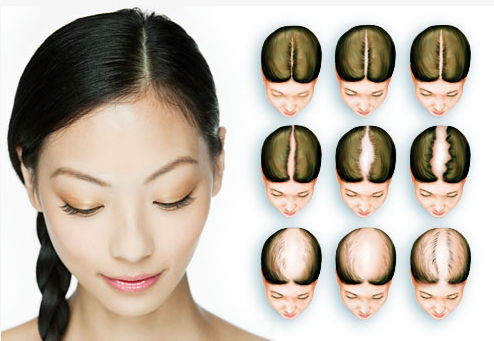
Hair has always been associated with femininity. It is one of the most essential aspects of a woman’s personality and determines her appearance. A woman’s self-esteem might suffer if she loses her hair. But how do ladies lose their hair and what hair loss treatments are available today in the market?
Women’s hair has always played an important role in their lives. It is inextricably linked to women’s beauty and youth. Every woman desires long, shiny, straight, and smooth hair. Many women believe that having a terrible hair day equates to having a bad day,
but, they do lose their hair.
Women lose hair the same manner that men do, and it may thin out their entire scalp or make the central area thicker and wider. Few women have a receding hairline in the front. A woman, on the other hand, may acquire a bald patch on the crown of her head.
What is a normal amount of hair loss?
Every day, most people shed 50-100 strands of hair. You don’t need to worry, if you discover some in your hairbrush or on your clothing. However, if it begins to fall out in clumps or becomes thinner over time, consult your doctor.
What is the cause of hair loss in women?
There isn’t a single reason. Triggers range from medical illnesses (up to 30) to stress and lifestyle variables such as what you consume. Your genes also play a role. Sometimes doctors are unable to pinpoint a specific cause. Experts in hair loss recommend that you get checked for thyroid issues and hormone imbalances as a starting point. When the underlying reason is treated, hair frequently regrows.
Here are some of the most common causes of your hair loss if you are a woman:
Thyroid issues cause hair loss
Your hair growth cycle may suffer if your thyroid gland produces too much or too little hormone. You may experience weight loss or gain, become more sensitive to cold or heat, or notice changes in your heart rate. However, thinning hair is rarely the only indicator of a thyroid condition.
Alopecia Areata
Alopecia areata causes hair loss in large regions. The problem is your own immune system, which unintentionally assaults healthy hair follicles. However, in most circumstances, the harm is not permanent.
Crash Diets can cause hair loss
If you lose 15 pounds or more, you may lose some hair. You may lose some hair if you consume too much vitamin A or not enough protein. But, you don’t need to worry, as it will return once you resume a healthy diet.
PCOS is also a hair loss trigger
Your hormones are always out of whack if you have polycystic ovarian syndrome (PCOS). Extra hair might grow on your face and body while the hair on your head thins. PCOS can also result in ovulation issues, acne, and weight gain.
Cancer Treatment Causes Hair Loss
Chemotherapy and radiation therapy can both damage hair follicles and result in significant hair loss. However, the damage is nearly always temporary, and hair normally comes back following therapy.
The Pill is another hair loss trigger
Your hair may thin as a result of the hormones that restrict ovulation. If you have a family history of hair loss, you are more likely to experience it. Blood thinners and medications used to treat high blood pressure, heart disease, arthritis, and depression have all been related to hair loss.
Extreme Stress is one of the major hair loss triggers
The treatment might last 6 to 8 months and cause a lot of hair loss. Hair loss can be caused by extreme physical or mental stress. Serious sickness or extensive surgery, injuries requiring blood loss, or great mental suffering are all examples.
Women’s Hair Loss Treatment
Traditionally, mothers have applied a good brand of hair oil containing a combination of special herbs on their children’s hair to prevent hair loss. However, if you start losing hair, the best hair oil in the market may not be enough. But, you should not worry as there are various hair loss treatments and medications on the market that may be beneficial.
Minoxidil (Rogaine), for example, is an FDA-approved treatment for female pattern hair loss. In most women, it can halt or stop it, and it may help hair grow back. However, the advantages vanish when you stop using it. Corticosteroids can help women with alopecia areata regain hair. If the cause is an underlying medical condition or inadequate nutrition, your hair should regrow on its own once things are under control.
Apart from that, hair transplant is regarded as a successful therapy for many forms of female hair loss. Hair transplants are used to restore hair growth to areas of the scalp where it has been limited or non-existent. They, however, cannot prevent future hair loss. Long-term consequences may necessitate more transplants.
We at Jata Hair Sciences understand how much you value your hair and have hence brought some of the best hair loss treatments for you if you are a woman. These include QR678, and Regenera Activa.
QR 678 ® is a ‘Made in India’ formulation that has established an international reputation for producing the most successful, efficient results faster than any other surgical or non-surgical hair restoration procedure now available.
Regenera Activa, also known as Autologous micrograft technology (AMT) is a unique one-time hair restoration treatment that is non-invasive and needs no downtime.
Jata Hair Sciences has been providing these treatments to its patients and sending back home happy customers.